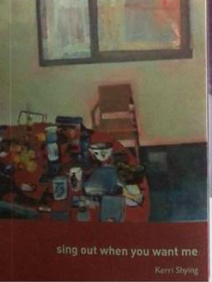 Reviewed by Magdalena Ball
Reviewed by Magdalena Ball
sing out when you want me
By Kerri Shying
Translation by Fish Hun
Flying Island Books/Cerberus Press
Paperback, ISBN: 978-99965-57-22-4, Dec 2017, $10
Before I explore the words of Kerri Shying’s poetry collection sing out when you want me, I must mention how pleasurable, as objects, the Flying Island Pocket Books series is. As the series name indicates, these books are small enough to actually fit in a solid sized jacket or back pocket, and certainly neat enough to fit in a handbag without impacting on weight. As someone who carries a lot of books and likes to travel light, I appreciate the format, and the fact that the pocket size is augmented by exceptional quality. The French fold flapped covers make bookmarking easy, the original artwork, the page layout, and the careful layout of words on the page make these books enticing even before you begin reading. sing out when you want me features a Chinese translation on facing pages, in a way that doesn’t interrupt the flow but somehow adds to the visual quality of each work, almost creating an echo that is non-linguistic for those who don’t speak Chinese. I suspect the reverse might be true for Chinese speakers.
Shying is known for the tough, straight-talking quality of her poetry, and there’s plenty of straight-talking here. The language is accessible and often humorous, each poem telling a little story, identifying an ephiphany, a howl for help or connection, or just a nod to the power of a moment shared. The text is all lower case, and there is no punctuation, only spacing and line breaks to indicate pauses. This softens the poems, quietens them somehow, and in a way that links to the title of the collection, invites the reader to engage deeply, allowing for multiple possibilities for reading each line.
The settings are mostly domestic and local, but also sit in the space between nostalgia and transformation:
beauty is self-fulfilling
is what I know for sure and hame
well it never fell on me (“death traps”)
The reader is invited to think about the creative process in conjunction with the survival process: the daily poem, the daily aches and pains of chronic health issues, the daily process of tending to our homes, our gardens, the world, our lives:
fourth stanza
gone you
fleeting bastards get the pen before you sleep (“regretsy”)
The work is often full of sensation like the bite of a mosquito or the pain of a fall that ends up with a hospital visit, cuckoos calling “life” (even with death all around), the scent of ginger, lemon, turmeric and honey tea, the taste of loquats, or the sound of a woman’s laughter remembered. Though there is much that is nurturing in this book, it is also angry and political:
inoculated
we are able we are anti the bodies
history cleans the bones (“titrate”)
Much of the work is rich with a sense of loss heritage – “speech/we no longer/understand”, lost dignity, lost friends, and lost dreams:
Obsolete and winded
My veins begin a dull red ache churning beyond capacity
face cannot be saved let alone the earth (“the waterworld”)
There is a contained quality to the poems which makes them cozy, in spite of the gutsy rage that glistens just beneath the surface of the words. Many of the poems explore the idea of being locked into a Sisyphean cycle (“Sisyphus of the scrapheap”) that pivots around ‘nesting’: making beds, taking care of the dog, raising children and watching them leave, laying fires, pushing the wheelbarrow, tending to the garden in a way that is both meaningless because temporary and subject to decay, and everything: “the trick of keeping going when you cannot”.
sing out when you need me is a powerful collection which reads easily but continues to reveal secrets and expand outward with each re-reading. The mostly short poems stay with you, becoming little charms against all of our inevitable deteriorations. It is all about “keeping going” which, in the face of pain, poverty, confinement, medical visits, the poking and prodding of life itself, becomes a heroic, transcendent act:
brace yourself there is no eye there
is a day just the warm and not (“blue eye doctor”)